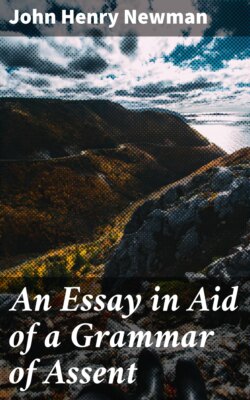An Essay in Aid of a Grammar of Assent

Реклама. ООО «ЛитРес», ИНН: 7719571260.
Оглавление
John Henry Newman. An Essay in Aid of a Grammar of Assent
An Essay in Aid of a Grammar of Assent
Table of Contents
Dedication
Part I. Assent And Apprehension
Chapter I. Modes Of Holding And Apprehending Propositions
§ 1. Modes of Holding Propositions
§ 2. Modes of apprehending Propositions
Chapter II. Assent Considered As Apprehensive
Chapter III. The Apprehension Of Propositions
Chapter IV. Notional And Real Assent
§ 1. Notional Assents
§ 2. Real Assents
§ 3. Notional and Real Assents Contrasted
Chapter V. Apprehension And Assent In The Matter Of Religion
§ 1. Belief in One God
§ 2. Belief in the Holy Trinity
§ 3. Belief in Dogmatic Theology
Part II. Assent And Inference
Chapter VI. Assent Considered As Unconditional
§ 1. Simple Assent
§ 2. Complex Assent
Chapter VII. Certitude
§ 1. Assent and Certitude Contrasted
§ 2. Indefectibility of Certitude
Chapter VIII. Inference
§ 1. Formal Inference
§ 2. Informal Inference
§ 3. Natural Inference
Chapter IX. The Illative Sense
§ 1. The Sanction of the Illative Sense
§ 2. The Nature of the Illative Sense
§ 3. The Range of the Illative Sense
Chapter X. Inference And Assent In The Matter Of Religion
§ 1. Natural Religion
§ 2. Revealed Religion
Note
Отрывок из книги
John Henry Newman
Published by Good Press, 2020
.....
If a child asks, “What is Lucern?” and is answered, “Lucern is medicago sativa, of the class Diadelphia and order Decandria;” and henceforth says obediently, “Lucern is medicago sativa, &c.,” he makes no act of assent to the proposition which he enunciates, but speaks like a parrot. But, if he is told, “Lucern is food for cattle,” and is shown cows grazing in a meadow, then though he never saw lucern, and knows nothing at all about it, besides what he has learned from the predicate, he is in a position to make as genuine an assent to the proposition “Lucern is food for cattle,” on the word of his informant, as if he knew ever so much more about lucern. And as soon as he has got as far as this, he may go further. He now knows enough about lucern, to enable him to apprehend propositions which have lucern for their predicate, should they come before him for assent, as, “That field is sown with lucern,” or “Clover is not lucern.”
Yet there is a way, in which the child can give an indirect assent even to a proposition, in which he understood neither subject nor predicate. He cannot indeed in that case assent to the proposition itself, but he can assent to its truth. He cannot do more than assert that “Lucern is medicago sativa,” but he can assent to the proposition, “That lucern is medicago sativa is true.” For here is a predicate which he sufficiently apprehends, what is inapprehensible in the proposition being confined to the subject. Thus the child's mother might teach him to repeat a passage of Shakespeare, and when he asked the meaning of a particular line, such as “The quality of mercy is not strained,” or “Virtue itself turns [pg 016] vice, being misapplied,” she might answer him, that he was too young to understand it yet, but that it had a beautiful meaning, as he would one day know: and he, in faith on her word, might give his assent to such a proposition—not, that is, to the line itself which he had got by heart, and which would be beyond him, but to its being true, beautiful, and good.
.....